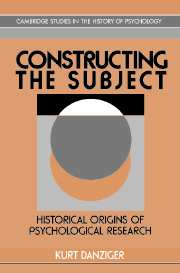Book contents
- Frontmatter
- Contents
- Preface
- 1 Introduction
- 2 Historical roots of the psychological laboratory
- 3 Divergence of investigative practice: The repudiation of Wundt
- 4 The social structure of psychological experimentation
- 5 The triumph of the aggregate
- 6 Identifying the subject in psychological research
- 7 Marketable methods
- 8 Investigative practice as a professional project
- 9 From quantification to methodolatry
- 10 Investigating persons
- 11 The social construction of psychological knowledge
- Appendix
- Notes
- Index
6 - Identifying the subject in psychological research
Published online by Cambridge University Press: 18 September 2009
- Frontmatter
- Contents
- Preface
- 1 Introduction
- 2 Historical roots of the psychological laboratory
- 3 Divergence of investigative practice: The repudiation of Wundt
- 4 The social structure of psychological experimentation
- 5 The triumph of the aggregate
- 6 Identifying the subject in psychological research
- 7 Marketable methods
- 8 Investigative practice as a professional project
- 9 From quantification to methodolatry
- 10 Investigating persons
- 11 The social construction of psychological knowledge
- Appendix
- Notes
- Index
Summary
Human sources for psychological generalization
Making psychological knowledge claims, we saw in the last chapter, involves an ordered set of attributions attached to a particular kind of subject. The significance of these attributions depends in a crucial way on the nature of the subject whose attributes they are claimed to be. If the subject is an individual consciousness, we get a very different kind of psychology than if the subject is a population of organisms. The gradual predominance of the latter type of subject was seen to depend on the interest of psychologists in a type of knowledge that was applicable to populations outside the laboratory but that was as abstract as the generalizations of the physical sciences. This meant working with artificially defined collective subjects in the research situation and then imposing these definitions on people outside the laboratory.
In other words, psychological research on populations had a tendency to replace the social categories that defined populations in real life with populations defined in terms of nonsocial categories. American psychology aimed to be a socially relevant science, but not a social science. Its approach was to be that of a natural science, although its ultimate field of application was to be found among members of real societies. Thus, research on socially defined populations came to be regarded as “applied” research, whereas “basic” research worked with abstract populations. In the extreme case the populations need not even be human. In fact, white rats fulfilled the role of a population of completely abstract organisms more adequately than any human population could hope to do.
- Type
- Chapter
- Information
- Constructing the SubjectHistorical Origins of Psychological Research, pp. 88 - 100Publisher: Cambridge University PressPrint publication year: 1990



